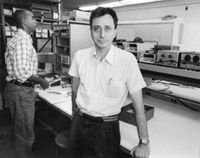
| ||
 |  | |

Professor Harry Leib (right) in the Communications Systems lab PHOTO: ANDREW DOBROWOLSKYJ |
A lab for learning PATRICK McDONAGH | Everyone in the Department of Electrical and Computer Engineering, from undergraduates to senior faculty, knows how effectively Harry Leib has run the Communications Systems lab. Now he has received national recognition from the Sanford Fleming Foundation, an organization concerned with engineering education, which has awarded him the $3,000 Wighton Fellowship. If anything, the award is overdue. Professor Nick Rumin nominated Leib back in 1995 when Rumin was still chair of the department. In his nomination letter, Rumin wrote that Leib had taken over a lab that was "in a sad state indeed" and had transformed it into a "state-of-the-art laboratory" while developing "a very successful research program with undergraduate students." As Professor Maier Blostein recalls, "When Leib was recruited, we were looking for someone who could renew the lab." Clearly, the hiring committee picked the right person. In 1989, the year Leib came to McGill, the communications lab was not a popular option for undergraduates. "I soon found out there was a good reason for this," recalls Leib. "The equipment was old, unreliable, and built in-house; it caused many problems for students." Lab results would rarely approach theoretical predictions, he said, "which gave the impression that everything was ad hoc." Professional standards of competence could not be developed in such an environment, and so he set out to get equipment comparable to that found in industrial labs, lobbying the department for funds. "The first investment was not very big, but students appreciated it, enrolment jumped, and we got a bigger budget," says Leib. When he began teaching the lab, there were 10 to 12 students per year; now the enrolment is capped at 60, but there is a demand to expand the lab so that more students can take the course. "Students really appreciate the practical component of communication systems," explains Florence Danilo, a graduate student and former TA of Leib's who is instructing the lab this term. "They see that theoretical results are not exactly what you get in practice." "We would like to buy another two lab stations so that we could have up to fourteen students per session (with three sessions running each term)," says Leib. The biggest challenge is financial. Each station requires almost $100,000 worth of equipment. A single spectrum analyser, a critical piece of lab equipment that looks like a portable television with too many buttons, costs $15,000. "I have to invest a lot of energy to convince the department to give me the money," he says with a laugh of resignation. And, he notes, as the lab grows it will also need a second technician to keep all that expensive equipment operating smoothly. The smooth, successful operation of the lab comes from a blend of facilities and pedagogy. "It's an experimental lab," Leib explains of the room that is filled with various electronic components -- amplifiers, filters, and the like -- that, to the uninitiated, are simply little blue-and-beige boxes with cords and knobs. "Students build systems, measure performances and compare them to theoretical results, and then figure out the reasons for the difference. Because there is always a difference," he notes. The first experiment, to get students motivated each term and to remind them that this work can be fun, is to build an AM receiver; students compete with each other, and with the best results of previous classes, to see who can receive the most radio stations. "It's a good exercise," says Leib, "because it involves putting things together and ending up with something that works." Leib himself has been remarkably successful in putting together something that works. Says Blostein, who also was involved in nominating Leib for the fellowship, "It really is recognition for the good job that he did. It is easy to relegate labs to the back yard, but that isn't a good thing to do." Leib agrees, saying that the award is especially gratifying because it recognizes the importance of lab teaching. "When students graduate and find a job, what they learn in the lab is probably the most important thing to their new career." In addition, he notes, "the lab provides a good opportunity to demonstrate professional leadership." However, lab teaching is "a field that doesn't receive a lot of glory," he says. Leib refuses to take all of the credit for the success of the communications systems lab. "I have very good teaching assistants," he notes. While he doesn't know what he will be doing with all of the fellowship money, he plans to give $1,000 to his TAs. After all, he notes, "it doesn't matter if you have the most sophisticated lab around. You need people who can run it properly." Leib is the second McGill professor to win the award; chemical engineering professor Martin Weber won in 1995. |